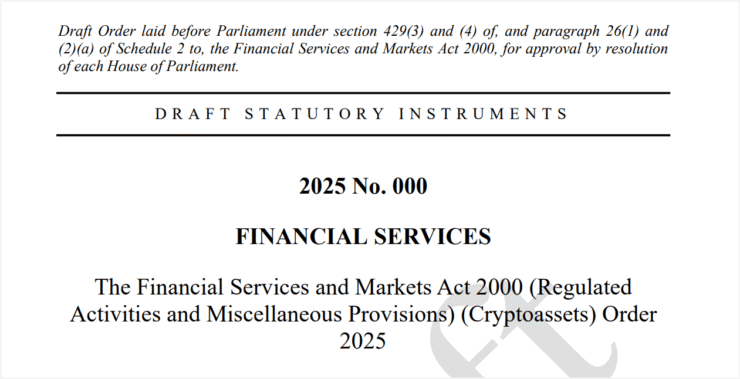The UK government has taken a major step toward regulating the digital asset sector with the release of its draft crypto legislation, designed to set clear standards for innovation while enhancing investor protection. The proposal, part of a wider financial modernization strategy, aims to boost confidence in crypto and expand oversight across more parts of the ecosystem.
The 27-page draft, formally titled the Financial Services and Markets Act 2000 (Cryptoassets) Order 2025, defines legal terms for digital assets, including stablecoins, and assigns regulatory obligations to entities involved in custody, trading, staking, and issuance.

Chancellor of the Exchequer Rachel Reeves positioned the initiative as central to Britain’s fintech leadership:
“Through our Plan for Change, we are making Britain the best place in the world to innovate—and the safest place for consumers,” she said.
“Robust rules around crypto will boost investor confidence, support the growth of fintech, and protect people across the UK.”
Draft Aims to Regulate Crypto Businesses
The proposed legislation introduces amendments to the Financial Services and Markets Act, including updates to the 2001 Regulated Activities Order (RAO), in order to bring crypto firms under formal UK financial regulation.
The updated RAO would designate stablecoins and other cryptoassets as “specified investments,” subjecting them to the same legal and compliance standards as traditional financial products. This change is seen as key to defining how digital asset services are governed in the UK.
The draft targets a wide range of crypto activities—including exchanges, dealers, and brokerages. A joint statement from His Majesty’s Treasury and Chancellor Reeves emphasized the dual goals of investor protection and innovation:
“Under the new rules, crypto exchanges, dealers, and agents will be brought into the regulatory perimeter—cracking down on bad actors while supporting legitimate innovation.”
Crypto companies serving UK residents will be required to meet stringent standards on transparency, customer protections, and operational resilience—criteria that already apply to traditional finance firms. This move to widen the regulatory perimeter underscores the UK’s bid to become a secure, forward-thinking hub for digital finance.
UK Advances Regulation With U.S. Coordination
The UK’s crypto regulation effort follows a period of international engagement and domestic planning. The draft law comes after recent discussions between Chancellor Reeves and U.S. Treasury Secretary Scott Bessent, where both parties expressed interest in deepening cooperation on digital securities and crypto oversight.
The current legislation builds on a 2023 Treasury consultation that initially proposed stablecoin and broader crypto rules. By November 2023, the UK government committed to implementing the framework. This new draft marks the transition from planning to execution.
In its statement, the government reaffirmed its intent to introduce final legislation “at the earliest opportunity”—pending input from crypto industry participants during the consultation window.
The push comes amid surging adoption. According to the Financial Conduct Authority, around 12% of UK citizens held crypto as of August 2024, up from just 4% in 2021. This dramatic rise has increased urgency for regulation that protects consumers while supporting digital asset innovation.
Quick Facts
- The UK has released a draft law to regulate crypto exchanges, dealers, and stablecoin issuers.
- New activities under regulation include trading platforms, custody services, and stablecoin issuance.
- Overseas stablecoin issuers without a UK base are exempt from these rules.
- The consultation period is open until May 23, 2025, with final rules expected by year-end.





